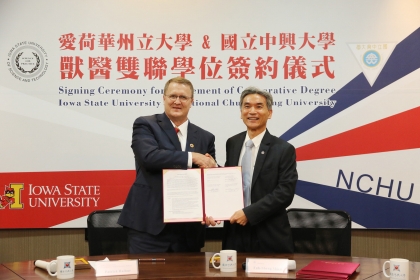NCHU takes the lead in Taiwan, signing an agreement in veterinary medicine joint dual college degree with two global renowned universities
2018-04-10
興新聞張貼者
Unit秘書室
3,217
National Chung Hsing University (NCHU) and Iowa State University (ISU) alliance to establish a joint dual college and professional clinical degree programs in Veterinary Medicine. NCHU and ISU held a signing ceremony on March 26, 2018. In fact, ISU marked the second university to have signed an alliance with NCHU as in February 2017, NCHU had also signed a cooperative agreement with Kansas State University (KSU) in joint dual degree in Veterinary Medicine. These joint dual programs of NCHU and both ISU and KSU are milestones in Taiwan.
The signing ceremony was attended by the representatives of ISU, including Patrick Halbur, dean of Veterinary Medicine, Qijing Zhan, deputy dean of Veterinary Medicine and professor Walter Haw Hsu and representatives of NCHU, including Shieu Fuh-Sheng(薛富盛), president of NCHU, vice president of NCHU and dean of Veterinary Medicine of NCHU. The key drivers of the dual program that include Chen Ter-Hsin(陳德勛), chief secretary of NCHU and former dean and vice dean of Veterinary Medicine, Chou Chi-Chung(周濟眾)and Hsu Wei-Li(徐維莉) were also invited to the witness the signing of the agreement.
The current veterinary medicine post graduate degree offered in the US typically takes about eight years to complete. It consist a four-year undergraduate courses and continuing another four-year post graduate courses. Whereas with the NCHU-ISU joint dual program, it takes typically takes only seven years in total to obtain a degree in veterinary medicine. The program requires the student to complete two full years of undergraduate courses at NCHU and an additional one year in preparatory courses at ISU and a four-year professional veterinary medicine college education. Eventually, the graduating student obtains both undergraduate and post graduate professional degree from both universities, and at the same time, qualifies as a licensure candidate for a professional veterinarian in both Taiwan and the US.
For the joint clinical medicine degree program in Veterinary Medicine, there are certain details to be determined in the negotiating progress, but once the program is implemented, the student will need to complete a four-year college program at NCHU and two to three years at the ISU for the master degree in clinical medicine. Comparing to the current education system, the joint program allows the student to obtain both a veterinary medicine bachelor degree in Taiwan and a master degree in US within a shorter period of time.
There are merely 30 veterinary medicine schools in 50 states of US, and for many years, only permanent residents are allowed to apply for in veterinary medicine schools. Currently, there are four universities in US that has abolished this restriction, allowing foreign students to apply for their veterinary medicine school, including University of California, Davis (UC Davis), University of Minnesota, ISU and KSU. The applicants are all undergraduate foreign students. NCHU marks the first university in Asia and is also the only university in Taiwan to have signed a joint dual program with two of the four universities in US, which greatly promotes more international opportunities for Taiwanese students.
The signing ceremony was attended by the representatives of ISU, including Patrick Halbur, dean of Veterinary Medicine, Qijing Zhan, deputy dean of Veterinary Medicine and professor Walter Haw Hsu and representatives of NCHU, including Shieu Fuh-Sheng(薛富盛), president of NCHU, vice president of NCHU and dean of Veterinary Medicine of NCHU. The key drivers of the dual program that include Chen Ter-Hsin(陳德勛), chief secretary of NCHU and former dean and vice dean of Veterinary Medicine, Chou Chi-Chung(周濟眾)and Hsu Wei-Li(徐維莉) were also invited to the witness the signing of the agreement.
The current veterinary medicine post graduate degree offered in the US typically takes about eight years to complete. It consist a four-year undergraduate courses and continuing another four-year post graduate courses. Whereas with the NCHU-ISU joint dual program, it takes typically takes only seven years in total to obtain a degree in veterinary medicine. The program requires the student to complete two full years of undergraduate courses at NCHU and an additional one year in preparatory courses at ISU and a four-year professional veterinary medicine college education. Eventually, the graduating student obtains both undergraduate and post graduate professional degree from both universities, and at the same time, qualifies as a licensure candidate for a professional veterinarian in both Taiwan and the US.
For the joint clinical medicine degree program in Veterinary Medicine, there are certain details to be determined in the negotiating progress, but once the program is implemented, the student will need to complete a four-year college program at NCHU and two to three years at the ISU for the master degree in clinical medicine. Comparing to the current education system, the joint program allows the student to obtain both a veterinary medicine bachelor degree in Taiwan and a master degree in US within a shorter period of time.
There are merely 30 veterinary medicine schools in 50 states of US, and for many years, only permanent residents are allowed to apply for in veterinary medicine schools. Currently, there are four universities in US that has abolished this restriction, allowing foreign students to apply for their veterinary medicine school, including University of California, Davis (UC Davis), University of Minnesota, ISU and KSU. The applicants are all undergraduate foreign students. NCHU marks the first university in Asia and is also the only university in Taiwan to have signed a joint dual program with two of the four universities in US, which greatly promotes more international opportunities for Taiwanese students.



